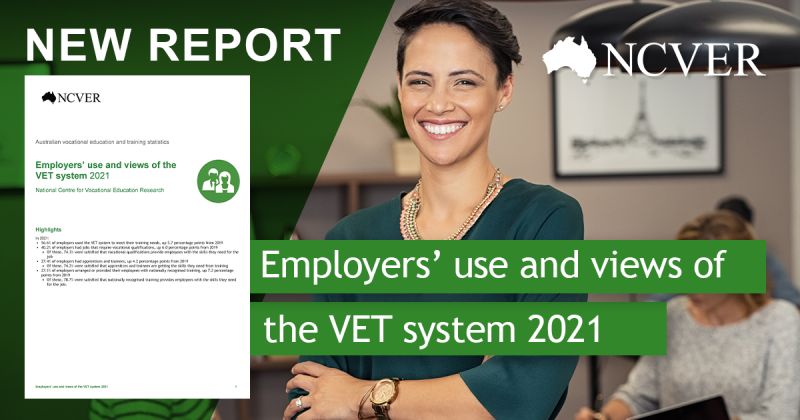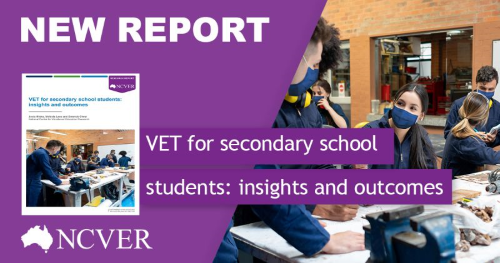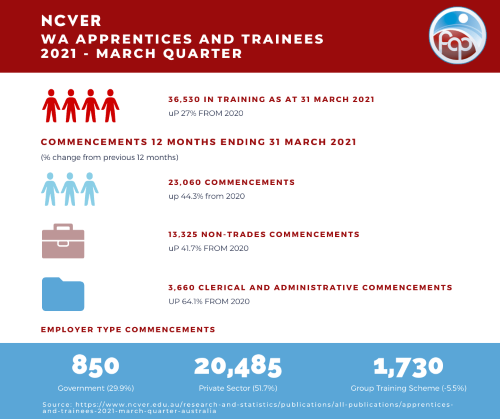Uncategorized
Diploma of Property (Agency Management – industry validation
Artibus Innovation, on behalf of the Property Services Industry Reference Committee, have advised that updates to the Diploma of Property (Agency Management) and draft units of competency, which are proposed as a specialist stream addition, are now available for industry validation. The addition of a professional stream to the Diploma of Property (Agency Management) will...
Uncategorized
Landmark VET reforms to drive skills-led economic future
A major overhaul of Australia’s vocational education and training (VET) system has been agreed by the Federal Government and states and territories. Changes to the training system will allow qualifications to be updated faster, ensuring industry is more responsive to skill shortages and workforce needs. A new Industry Clusters model which groups together aligned industries...
Uncategorized
Employers’ use and views of the VET system 2021
The latest report from National Centre for Vocational Education Research (NCVER) looking at Employers use and views on the VET system. Key finding include: 56.6% of employers used the VET system to meet their training needs (up 5.7% from 2019) 40.2% of employers had jobs that require vocational qualifications (up 6.0% from 2019) 27.4% of...
Uncategorized
VET for secondary school students
The latest report from the National Centre for Vocational Education Research (NCVER) on VET for secondary school students (Vfsss) has been released. Findings show that the most popular training packages in 2020 were Tourism, Travel & Hospitality, Business Services and Sports & Recreation. Students undertaking a School-based apprenticeships or traineeships (SBATs) as part of Vfsss...
Uncategorized
Youth discussion forums
Calling all 18—24 year-olds who want to undertake, have undertaken, or are completing a VET course, apprenticeship or traineeship. Would you like to have a say on issues facing young people within the training sector – what can be improved to make VET better for younger people? The State Training Board is organising a series...
Uncategorized
NCVER Apprentices and trainees 2001 – March quarter
Apprentices and trainees 2021- March quarter from National Centre for Vocational Education Research provides a national picture of apprenticeship and trainee activity, tracking outcomes from when they started their training through to December 2020. We’ve summarised this data, focusing on figures for WA and highlighting information relevant to our industry coverage. The full report can...
Uncategorized
Public Safety Training Package – Case for change
The Public Safety Industry Reference Committee has developed a Case for Change for Training Package development work to address priority skills needs in Fire Fighting Pump Technicians. The aim of the work is to ensure qualifications, Skill Sets and Units of Competency reflect current technologies, industry practices, and regulations in the firefighting (Public Safety) industry....
Uncategorized
Correctional Services Training Package – Case for change
The Corrections Industry Reference Committee has developed a Case for Change for Training Package development work to address priority skills needs in Correctional Administration. The aim of this work is to ensure qualifications and Units of Competency reflect current technologies, industry practices, and regulations in the Correctional Services industry. The Cases for Change can be...
Uncategorized
Regional engagement – Bunbury
Our Industry Engagement Managers Anna Thomas and Tracey Farrow continued their regional trips, heading to the port city of Bunbury today. They met with Bunbury Geographe Chamber of Commerce and Industry, South Regional TAFE Bunbury Campus, Employment Facilitator – South West Employment Region and Rob Marshall from the Institute of Professional Bookkeepers ICB Australia and...
Uncategorized
Microcredentials – what are they?
The term microcredential describes smaller bites of learning – or short-courses – offered by universities, TAFEs and private education providers. Microcredentials can work as stand-alone qualifications or complement study being undertaken at the VET or higher education level. Microcredentials allow people to access education when they want, at an affordable cost, to meet their imminent...











